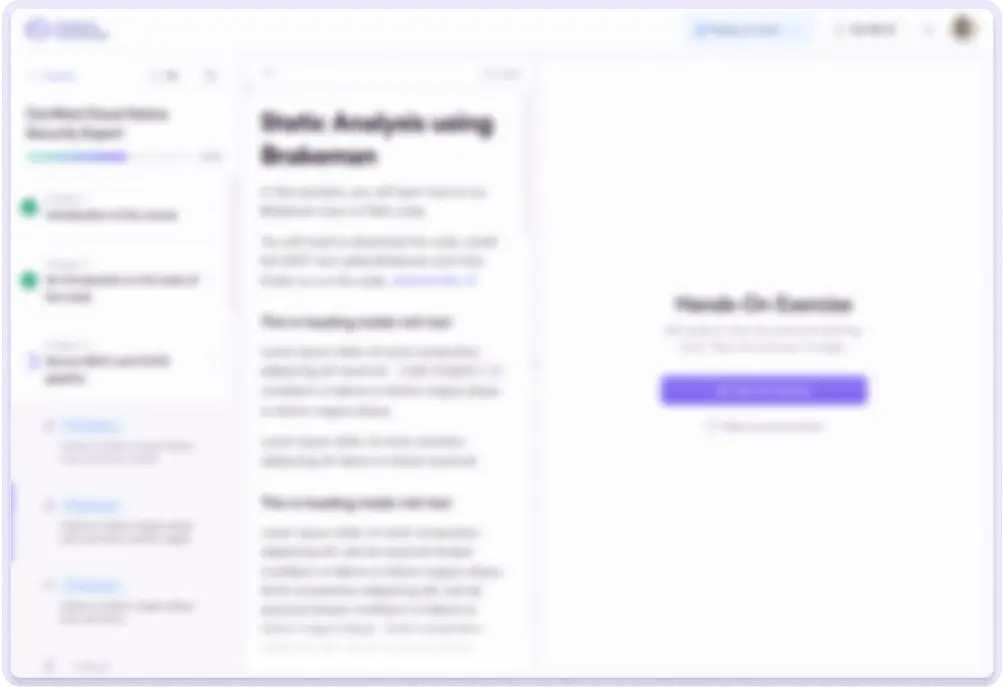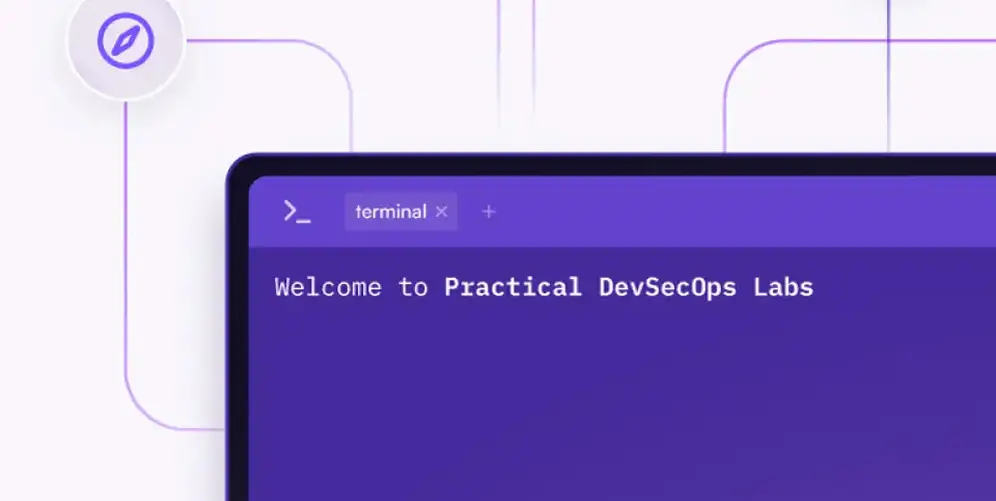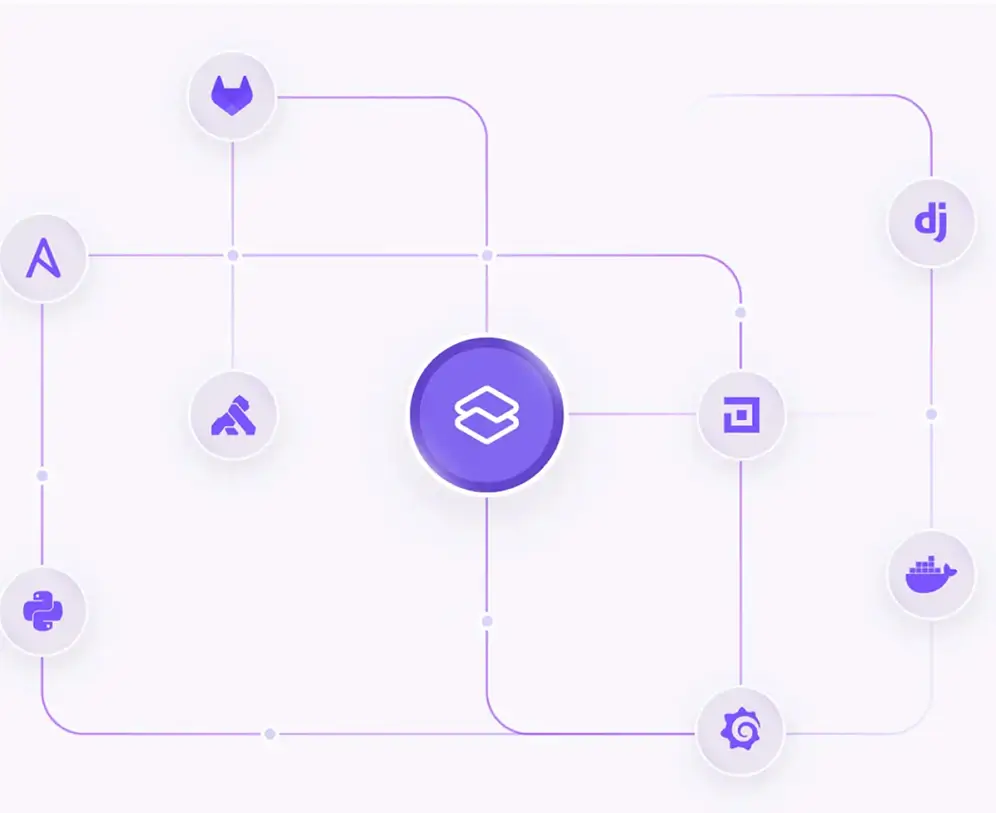





Trusted by 10,000+ Learners
Certified Container Security ExpertTM
Become a Container Security Expert. From Container fundamentals to advanced defense tactics, learn to identify, exploit, and protect containerized apps in real-world scenarios. 87% of learners report improved security posture within 2 months. Our Container Security Experts are used by 8 of 10 Fortune 500 tech companies.

Trusted by top companies across industries, empowering thousands of professionals worldwide. Join the ranks of security leaders
Course Chapters
Prerequisites
- Course participants should have knowledge of running basic Linux commands like ls, cd, mkdir, etc.,
Chapter 1: Introduction to Containers
- What is a container?
- Basics of a container and its challenge
- Container vs. Virtualization
- Container Advantages
- Container Disadvantages
- Container fundamentals
- Namespaces
- Cgroup
- Capabilities
- Docker architecture and its components
- Docker CLI
- Docker Engine (Daemon, API)
- Docker Runtime (containerd, shim, runc)
- Interacting with container ecosystem
- Docker images and image layers
- Build Container images using Dockerfile
- Docker image repository
- Running a container
- Managing / Orchestrating multiple containers
- Using CLI/API to manage multiple containers
- Docker Compose
- Docker Swarm
- Kubernetes
- Docker alternatives
- Podman
- CRI-O
- Hands-on Exercises:
- Working With Docker Command
- Docker Networking
- Manage Data in Docker
- Create Docker Image using Dockerfile
- Writing Dockerfile
- How To Use Container Registry
- Learn Docker Compose
- Working With Docker SDK
- Creating Container Snapshots
Chapter 2: Container Reconnaissance
- Overview of Container Security
- Attack surface of the container ecosystem
- Identifying the components and their security state
- Get an inventory of containers
- Docker Images
- Dockerfile and Environment variables
- Docker volumes
- Docker Networking
- Ports used/Port forwarding
- Docker Registries
- Exhaustive review of Namespaces, cgroups and capabilities
- Get an inventory of containers
- Analysis of the attack surface
- Using native tools
- Using third-party tools
- Hands-on Exercises:
- Using Built-in Docker Tools for Reconnaissance
- Use Third-party Tools for Image Inspection
- Scanning the Remote Host for Unauthenticated Docker API Access
- Identify a Container and Extract Sensitive Information
- Create and Restore a Snapshot of the Container for Further Analysis
Chapter 3: Attacking Containers and Containerized Apps
- Containers Attack Matrix
- Image-based attacks
- Malicious Images
- Extracting passwords, tokens, TLS certs, etc.
- Exploiting vulnerable components
- Registry-based attacks
- Insecure Docker registries
- Open Docker registries
- Lack of authorization (RBAC)
- Container-based attacks
- Manipulating the Privileged mode containers
- Attacking mounted docker volumes
- Abusing SetUID/SetGID binaries
- Exploiting shared namespaces
- Attacking Linux capabilities
- Docker host (Daemon) / kernel attacks
- Exploiting unauthenticated Docker API
- Insecure Docker endpoint
- Lack of network segregation
- Denial of service attacks
- Kernel exploits
- Privilege escalation methods in Docker
- Security misconfigurations
- Attacking management tools (Portainer)
- Exploiting OWASP Top 10 issues in containerized apps
- Security misconfigurations
- Hands-on Exercises:
- Backdooring Docker Image
- Inspecting Docker Daemon Activity
- Malicious Container Image
- Exploiting Containerized Apps
- Unsecured Docker Daemon
- Docker Exploitation using deepce
- Attacking Misconfigured Docker Registry
Chapter 4: Defending Containers and Containerized Apps on Scale
- Container image security
- Building secure container images
- Choosing base images
- Distroless images
- Scratch images
- Security Linting of Dockerfiles
- Static Analysis(SCA) of container images
- Scan for vulnerabilities in container
- Choosing the right container scanner tool for your needs
- Building secure container images
- Docker Daemon security configurations
- Docker user remapping
- Docker runtime security (gVisor, Kata)
- Docker socket configuration
- fd
- TCP socket
- TLS authentication
- Dynamic Analysis of the container hosts and daemons
- Docker host security configurations
- Kernel Hardening using Seccomp and AppArmor
- Custom policy creation using Seccomp and AppArmor
- Network Security in containers
- Segregating networks
- Misc Docker Security Configurations
- Content Trust and Integrity checks
- Docker Registry security configurations
- Private vs. Public Registries
- Authentication and Authorization (RBAC)
- Built-in Image scanning capabilities
- Policy enforcement
- DevOps CI/CD Integration
- Docker Tools, Techniques and Tactics
- Tools
- Dive (Forensic)
- Dockle
- Techniques
- Tactics
- Tools
- Hands-On Exercises:
- Static Analysis using Hadolint
- Scanning Docker for Vulnerabilities With Trivy
- Embedding Trivy Scanning in GitLab CI
- Build a Secure, Miniature Image With Distroless To Minimize Attack Footprint
- Minimize Docker Security Misconfigurations With CIS Compliance
- Securing Container Images by Default Using Harbor
- Signing Container Images for Trust
Chapter 5: Security Monitoring of Containers
- Monitoring Docker events, logs
- Incident response in containers
- Docker runtime prevention
- Policy creation, enforcement, and management
- Docker security monitoring using Wazuh
- Hands-On Exercises:
- Auditing Docker using AuditD
- Sysdig Falco – Runtime Protection and Monitoring
- Tracee – Runtime Security
Practical DevSecOps Certification Process
- After completing the course, you can schedule the CCSE exam on your preferred date.
- Process of achieving Practical DevSecOps CCSE Certification can be found on the exam and certification page.
Become a Container Security Expert in 60 Days

What you’ll learn from the
Certified Container Security Expert Course?
Container Fundamentals
- Build and manage Docker containers and images
- Configure container registries securely
- Practice with hands-on live environments
Attack Surface Analysis
- Identify risks in Docker components and volumes
- Analyze container networks and registries
- Use native and third-party security tools
Container Attack Techniques
- Execute image backdooring and registry exploits
- Perform privilege escalation attacks
- Test Docker daemon security vulnerabilities
Container Defense Implementation
- Build secure container images from scratch
- Apply Seccomp and AppArmor hardening
- Integrate vulnerability scanning in CI/CD
Security Monitoring Systems
- Configure Sysdig Falco and Tracee for runtime monitoring
- Implement Wazuh for incident detection
- Respond to container security incidents
Damage Control Strategies
- Apply container isolation techniques
- Implement network segmentation controls
- Build defense-in-depth for containerized applications
We have provided training and presented at numerous industry events.





Benefits of Enrolling in the Practical DevSecOps Courses
Master today’s security challenges with our updated curriculum and hands-on labs, preparing you for real-world threats.
Browser-based lab
Access all tools and exercise directly in your browser. Enjoy a practical, hassle-free learning experience - no downloads or installations needed!

Explore commands with our new AI-Powered 'Explain to me' feature
Gain detailed insights into any command with our AI-powered feature, designed to enhance your understanding and accelerate your learning.
Master cutting-edge tools
Enhance your security skills through hands-on experience with the latest industry tools in our labs. Get equipped for real-world applications and stay ahead of industry changes.

Become a Container Security Expert in 60 Days
Hear from our learners
Explore the global impact of our Practical DevSecOps Certifications through our learners’ testimonials.
Frequently asked questions
What are the prerequisites required before enrolling in the Container Security Certification Course?
Basic Linux command knowledge is required before enrolling in this course.
What’s included in the Container Security Certification Course package?
Your package includes 3-year access to all course videos, 30-day access to browser-based labs, a comprehensive PDF manual, 24/7 technical support, and one certification exam attempt.
Do the Labs for the Container Security Certification Course Start Immediately after enrollment?
No, After enrollment, you’ll select your preferred start date. Your course access begins on your chosen date rather than automatically after purchase.
Does the Container Security Certification Course come with CPE points?
Yes, the Container security course gives you 24 CPE points.
What is the Exam Format for the Container Security Certification Course?
Should I go to an exam center, or is the exam online?
Yes, The exam is entirely online, allowing you to complete it from your home or office.
How long is the Container Security certification valid?
The Container Security Expert Certification is a lifetime credential with no renewal requirements.
What Career Boost Does the Certified Container Security Expert Course Provide?
The CCSE certification transforms your career trajectory from tactical implementer to trusted security leader. While uncertified professionals in container security typically earn $75,000–$90,000, CCSE-certified experts command $152,000–$160,000, with senior roles exceeding $200,000.
This dramatic salary increase reflects the market reality: container security is exploding from $2.4 billion in 2024 to $25.5 billion by the mid-2030s (26.5% CAGR), creating massive demand for certified experts. DevOps engineers, cloud architects, and Kubernetes administrators who complete CCSE gain the proven expertise that companies desperately need.
Beyond compensation, CCSE certification elevates your professional standing—you’ll report to senior leadership, influence critical security decisions, and be recognized as an indispensable strategic asset rather than just another technical resource. In a rapidly growing market, CCSE positions you to capture the premium opportunities while others remain stuck in entry-level roles.
Why Certified Container Security Expert Course from Practical DevSecOps?
The Container Security Expert Training from Practical DevSecOps offers several compelling advantages:
Comprehensive curriculum: The course covers the complete container security lifecycle – from fundamentals to advanced monitoring and defense strategies. You’ll gain expertise in all aspects of container security.
Practical, hands-on approach: Each chapter includes multiple hands-on exercises that reinforce theoretical concepts with real-world applications. You’ll work directly with tools like Docker, Trivy, Falco, and more.
Both offensive and defensive skills: The training doesn’t just teach you how to defend – it also shows you how attackers think. You’ll learn attack techniques (chapter 3) and then how to defend against them (chapter 4).
Industry-relevant tools: The curriculum incorporates widely used security tools in the container ecosystem, preparing you to work with technologies actually used in enterprise environments.
Scalable security knowledge: The course progresses from single container security to managing security at scale, making it valuable whether you work with small deployments or large container orchestration systems.
If you’re looking to build specialized security skills in containerization – an increasingly critical area of modern infrastructure – this curriculum appears to provide both depth and breadth of knowledge with a strong emphasis on practical application.
Unmatched practical focus
70% hands-on labs for Mastering real-world scenario’s.
Expert-crafted curriculum
Get real-world insights from the experienced Security Experts.
Practical exam
Take a 6-hour examination to show what you have learned.
24/7 expert support











